人教版 高中 英语 必修3 Unit 1 Festivals around the world语法情态动词课件(共36张PPT)
文档属性
| 名称 | 人教版 高中 英语 必修3 Unit 1 Festivals around the world语法情态动词课件(共36张PPT) |
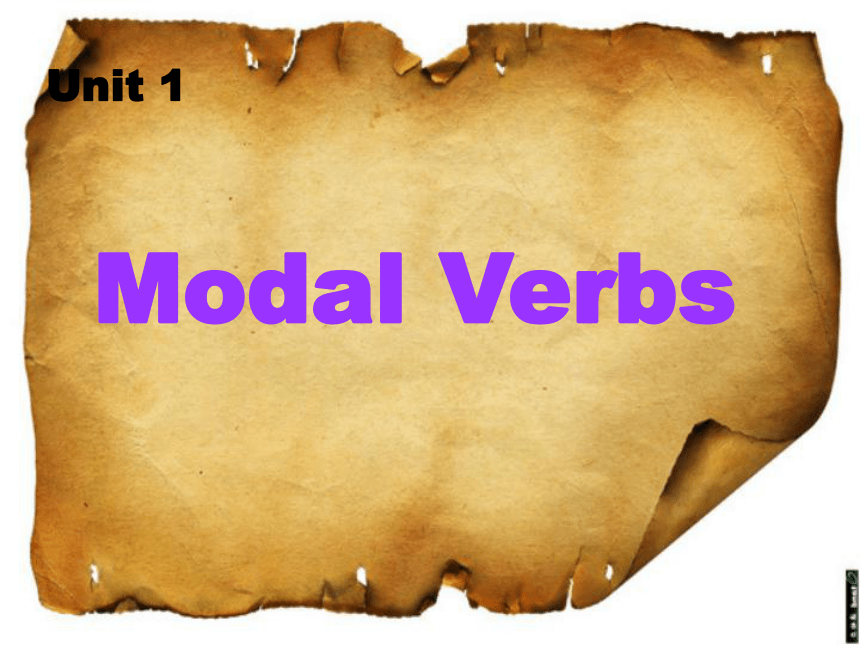
|
|
| 格式 | zip | ||
| 文件大小 | 7.1MB | ||
| 资源类型 | 教案 | ||
| 版本资源 | 人教版(新课程标准) | ||
| 科目 | 英语 | ||
| 更新时间 | 2020-03-22 00:00:00 | ||
图片预览

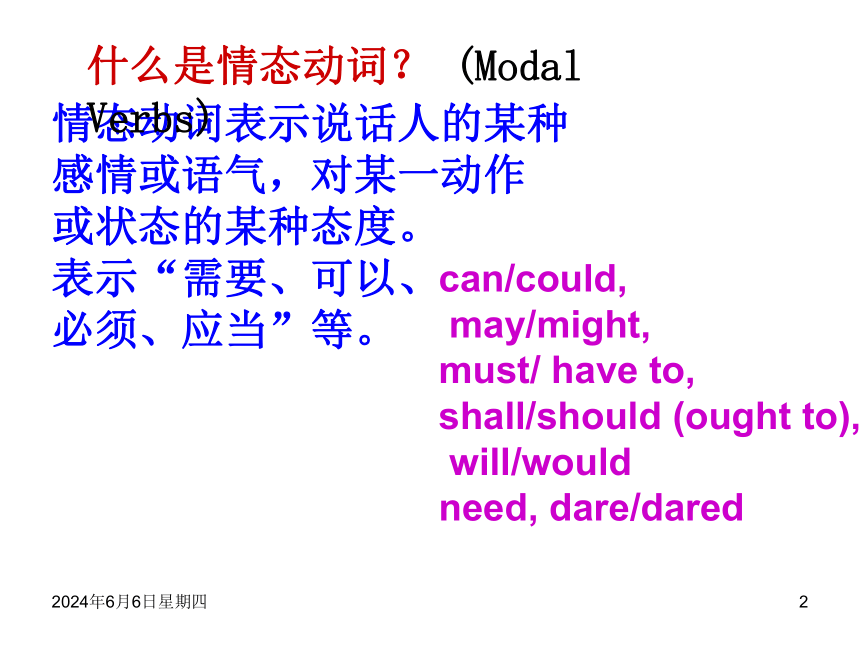
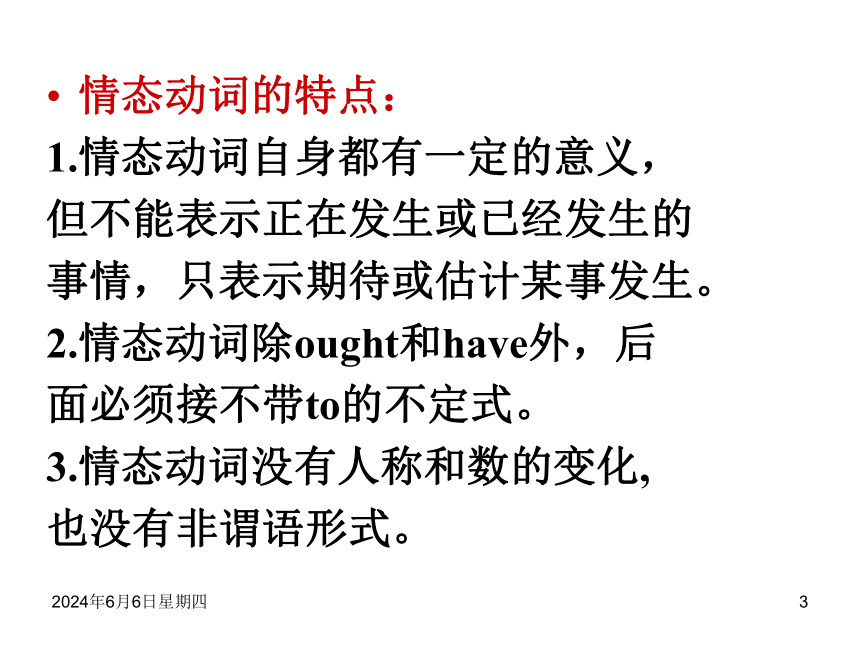

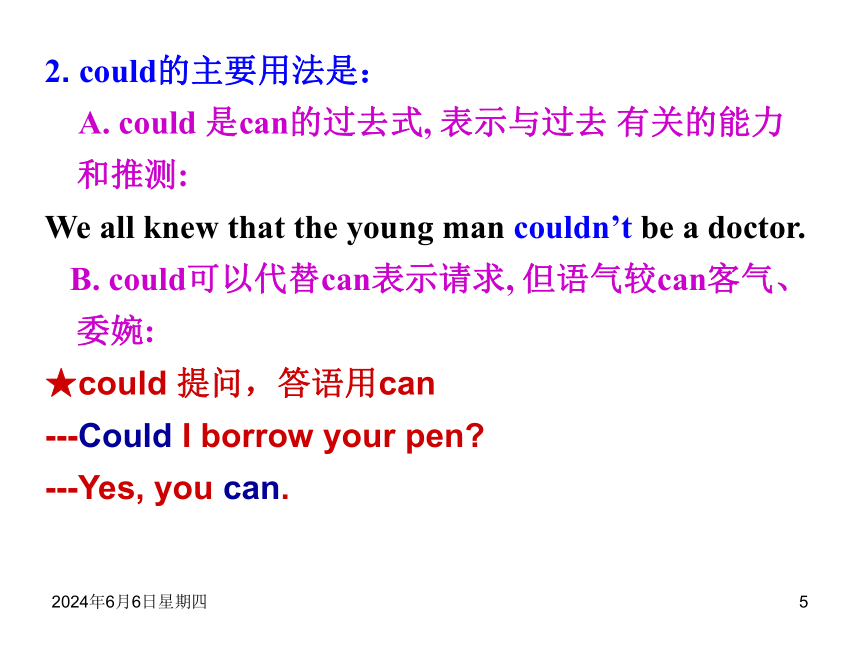

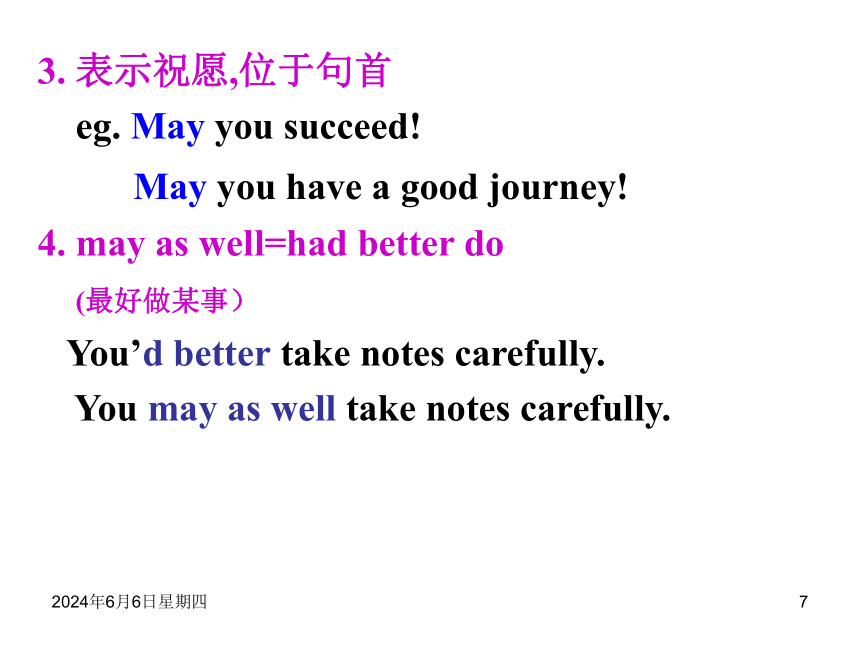

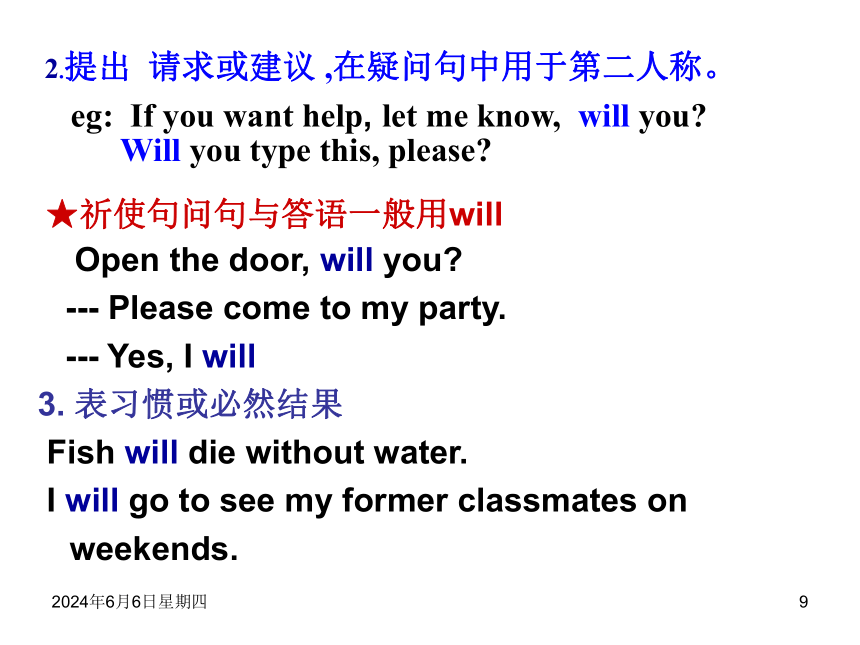

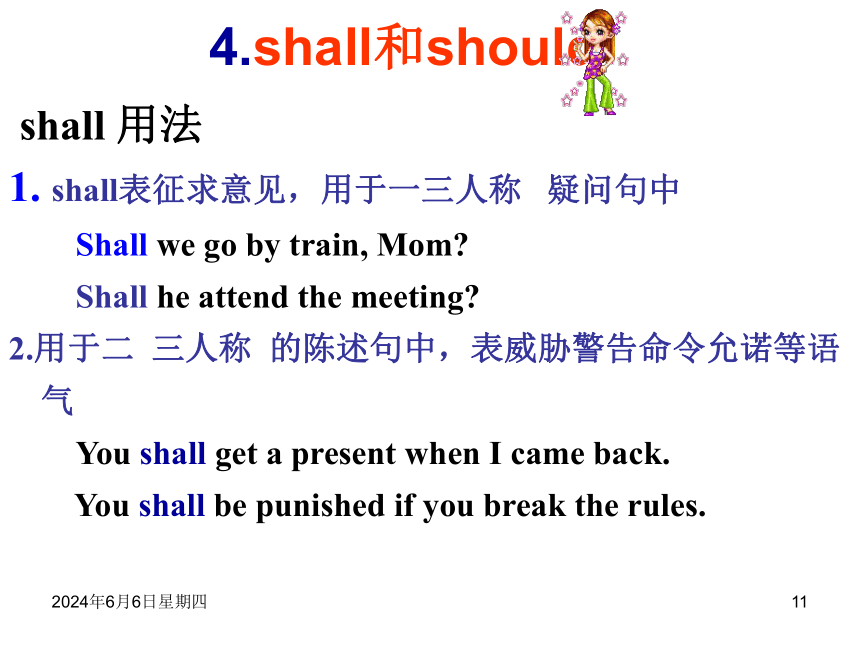
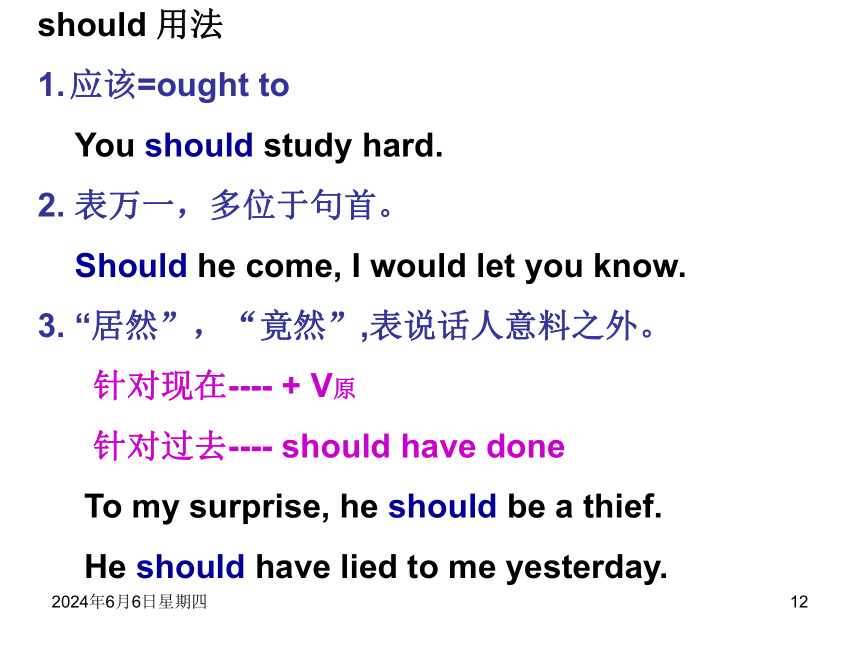
文档简介
(共43张PPT)
Modal Verbs
Unit 1
情态动词表示说话人的某种
感情或语气,对某一动作
或状态的某种态度。
表示“需要、可以、
必须、应当”等。
什么是情态动词? (Modal Verbs)
can/could,
may/might,
must/ have to,
shall/should (ought to),
will/would
need, dare/dared
情态动词的特点:
1.情态动词自身都有一定的意义,
但不能表示正在发生或已经发生的
事情,只表示期待或估计某事发生。
2.情态动词除ought和have外,后
面必须接不带to的不定式。
3.情态动词没有人称和数的变化,
也没有非谓语形式。
1. can的主要用法是:
? A.? 表能力
eg. The girl can dance very well.
be able to 通过努力做成某事
He was able to reach Mount Qomolangma in 2000.
B.? 表示说话者的推测﹑事物的可能性:(否、疑)
eg. Can the news be true?
C. 在口语中, can可以表示请求或允许:
eg. Can I sit here?
1. can和could
2. could的主要用法是:
A. could 是can的过去式, 表示与过去 有关的能力和推测:
We all knew that the young man couldn’t be a doctor.
B. could可以代替can表示请求, 但语气较can客气、委婉:
★could 提问,答语用can
---Could I borrow your pen?
---Yes, you can.
may 常用来表示:
?1. 在正式文体中表示请求、允许(比can正式)::
?? eg. May I come in ?
You may go now.
2. 表示说话人的猜测: “也许” “可能”: 通常只用于肯定句和否定句中。
The guest may arrive this afternoon.
---Can he attend the meeting?
---Yes, he____. I am not sure.
2.may和might
may
3. 表示祝愿,位于句首
eg. May you succeed!
May you have a good journey!
4. may as well=had better do
(最好做某事)
You’d better take notes carefully.
You may as well take notes carefully.
3.will和would
will是助动词还是情态动词?
will用于构成将来时是助动词。
eg. I will tell you something important.
我要告诉你一件重要的事情。
情态动词:1.表意愿或意志
I will never do it again.
If you will marry me, whatever I have is yours, and mines is yours.
2.提出 请求或建议 ,在疑问句中用于第二人称。
eg: If you want help, let me know, will you?
Will you type this, please?
★祈使句问句与答语一般用will
Open the door, will you?
--- Please come to my party.
--- Yes, I will
3. 表习惯或必然结果
Fish will die without water.
I will go to see my former classmates on weekends.
would & used to (过去常常,习惯于)
would 现在有可能做,也有可能不做
used to 现在一定没有做
There used to be a big tree.
I would go to the library when I was free.
I _______ to cry when I was a child.
used to
4.shall和should
shall 用法
1. shall表征求意见,用于一三人称 疑问句中
Shall we go by train, Mom?
Shall he attend the meeting?
2.用于二 三人称 的陈述句中,表威胁警告命令允诺等语气
You shall get a present when I came back.
You shall be punished if you break the rules.
should 用法
应该=ought to
You should study hard.
2. 表万一,多位于句首。
Should he come, I would let you know.
3. “居然”,“竟然”,表说话人意料之外。
针对现在---- + V原
针对过去---- should have done
To my surprise, he should be a thief.
He should have lied to me yesterday.
5.must的主要用法
1. 必须。must表主观“必须”
have to 表客观“不得不”
I must go home this Saturday.
I’ve got a cold, so I have to see a doctor.
---Must I stay here?
---Yes, you must./
No, you needn’t./you don’t have to.
★mustn‘t 表禁止,不准,一定不要。
You mustn't play with fire.
You mustn't take drugs.
2. 表“偏要”“偏偏”,违背说话人意愿。
Must you talk in class?
---How much do you earn?
---I’ll tell you if you must know it.
3. 一定,肯定
He must be crazy.
He must have stayed up last night.
4. 表推测的反应,反义疑问句中不能出现must的形式,反义形式取决于句中时态
1.He must be my English teacher,
2. He must have finished his homework,
3. It must have rained yesterday,
isn’t he?
hasn’t he?
didn’t it?
表示推测——情态动词的重要用法
肯定的推测
可能的推测
否定的推测
疑问的推测
must
对将来 对现在 对过去
情态动词
may, might
can’t,
couldn’t
can, could
+ V. + V. + have done
常见must be + be doing
+ V. + V. + have done
+ be doing
可以用not表示“可能不”
+V. + V. + have done
+ be doing
+ V. + V. + have done
+ be doing
Practice :表示推测——情态动词的重要用法
1. You must be Mr Smith----I was told to expect
you here.
2. He must have known what we wanted.
3. We may have read the same report.
4. He can’t have slept through all that noise.
5. There’s someone outside----who can it be?
6. What can they be doing?
7. These pills might help to cure your disease.
8. You could be right, I suppose.
1. I don’t know where she is. She _______ be in
Wuhan.
2. At this moment, our teacher ________________
our exam papers.
这时, 我们老师想必在批改试卷。
3. The road is wet. It ________________ last night.
(rain)
4. Your mother ______________________ for you.
你妈妈一定一直在找你。
5. Mike ________________ his car, for he came
to work by bus this morning.
迈克一定还没有找回他的车, 因为早上他是
坐公共汽车来上班的。
may
must be marking
must have rained
must have been looking
Practice 2: Fill in the blanks.
can’t have found
need & dare (dared)
情态动词 :
need/dare do sth
need/dare not do sth
实意动词:
need/dare to do sth
don’t/doesn’t/didn’t dare to do sth
(无单三形式)
1.Could you lend me your book?
Certainly I can.
2.Might I ask you a question?
Yes, you may.
3.Would you do me a favour?
Of course, I will.
4.But would you like to do it for me?
Yes, I would like/love to.
5.---Need I type this letter?
---Yes , you must./Yes , you have to.
(No, you needn’t.)
6.Must we do it now?
Yes, you must./Yes, you have to.
(No, you needn’t.
No,you don’t have to.
No, you don’t need to.)
1.Being afraid of making mistakes ,he ____ answer his teacher's question
A. doesn't dare B. doesn't dare to
C. daren't to D. not dare to
2.Having failed the exam, the little boy __go home and face his mom.
A. dares not to B. dares not
C. dare not to D. dare not
情态动词+have done
should/ought to have done
shouldn’t have done
must have done
can’t/couldn’t have done
could have done
need have done
needn’t have done
(针对过去)
1 Children under 12 years of age in that
country ____ be under adult
supervision when in a public library.
(2004 上海)
A. must B. may
C. can D. need
2 Some aspects of a pilot’s job_____ be
boring, and pilots often _____ work at inconvenient hours. (2006 湖南)
A. can;have to
B. may;can
C. have to; may
D. ought to; must
3The weather turned out to be fine
yesterday. I _____ the trouble to carry
my umbrella with me. (2006 江西)
A should have taken
B could have taken
C needn’t have taken
D mustn’t have taken
4 —How’s your tour around the North
Lake? Is it beautiful?
—It ________ be, but it is now heavily
polluted. (2007 全国I)
A. will B. would
C. should D. must
5 I told your friend how to get to the hotel, but perhaps I have driven her there. (2007 陕西)
A. could B. must
C. might D. should
7. (10湖南23) You ______ buy a gift, but
you can if you want to.
A. must B. mustn’t
C. have to D. don’t have to
8. (10江西23) I have told you the truth.
______ I keep repeating it?
A. Must B. Can C. May D. Will
D
A
9. — It’s the office! So you _____ know
eating is not allowed here.
— Oh, sorry. (2009湖南卷)
A. must B. will C. may D. need
10. What do you mean, there are only
ten tickets? There _______ be twelve.
(2009 全国卷I)
A. should B. would
C. will D. shall
A
A
11. I can’t leave. She told me that I _____
stay here until she comes back.
(2009 全国卷II)
A. can B. must C. will D. may
12. He must be helping the old man to
water the flowers, _______?
(2009 陕西卷)
A. is he B. isn’t he
C. must he D. mustn’t he
B
B
13. ---- Will you go skating with me this winter
vacation?
---- It _____ . (2002上海)
A. all depended B. all depends
C. is all depended D. is all depending
解析: 答案B。It all depends 是“不确定”、
“看情况”的意思。
B
根据汉语完成句子。
A: ____________________(我可以跟朋友
去) to the harvest festival?
B: Yes, you may.
A: If I want to be a doctor, ____________
_______ (我应该学理科吗)?
B: I think so.
May I go with friends
should I study
science
3. I don't know where she is, she _____
___________ (可能在武汉).
4. At this moment, our teacher
_______________ (想必在批改) our
exam papers.
5. The road is wet. It ________________
(肯定下雨了) last night.
6. Your mother ______________________
______ (一定一直在找你).
may
must be marking
must have rained
must have been looking
be in Wuhan
for you
7. Philip ____________________________
__________________________(可能在车
祸中受了重伤).
8. ---Linda has gone to work, but her bicycle
is still here.
---She ____________________ (可能上班)
by bus.
9. Mike _______________ (一定还没有找回)
his car, for he came to work by bus this
morning.
may (might) have been hurt
may (might) have gone
can’t have found
seriously in the car accident
Modal Verbs
Unit 1
情态动词表示说话人的某种
感情或语气,对某一动作
或状态的某种态度。
表示“需要、可以、
必须、应当”等。
什么是情态动词? (Modal Verbs)
can/could,
may/might,
must/ have to,
shall/should (ought to),
will/would
need, dare/dared
情态动词的特点:
1.情态动词自身都有一定的意义,
但不能表示正在发生或已经发生的
事情,只表示期待或估计某事发生。
2.情态动词除ought和have外,后
面必须接不带to的不定式。
3.情态动词没有人称和数的变化,
也没有非谓语形式。
1. can的主要用法是:
? A.? 表能力
eg. The girl can dance very well.
be able to 通过努力做成某事
He was able to reach Mount Qomolangma in 2000.
B.? 表示说话者的推测﹑事物的可能性:(否、疑)
eg. Can the news be true?
C. 在口语中, can可以表示请求或允许:
eg. Can I sit here?
1. can和could
2. could的主要用法是:
A. could 是can的过去式, 表示与过去 有关的能力和推测:
We all knew that the young man couldn’t be a doctor.
B. could可以代替can表示请求, 但语气较can客气、委婉:
★could 提问,答语用can
---Could I borrow your pen?
---Yes, you can.
may 常用来表示:
?1. 在正式文体中表示请求、允许(比can正式)::
?? eg. May I come in ?
You may go now.
2. 表示说话人的猜测: “也许” “可能”: 通常只用于肯定句和否定句中。
The guest may arrive this afternoon.
---Can he attend the meeting?
---Yes, he____. I am not sure.
2.may和might
may
3. 表示祝愿,位于句首
eg. May you succeed!
May you have a good journey!
4. may as well=had better do
(最好做某事)
You’d better take notes carefully.
You may as well take notes carefully.
3.will和would
will是助动词还是情态动词?
will用于构成将来时是助动词。
eg. I will tell you something important.
我要告诉你一件重要的事情。
情态动词:1.表意愿或意志
I will never do it again.
If you will marry me, whatever I have is yours, and mines is yours.
2.提出 请求或建议 ,在疑问句中用于第二人称。
eg: If you want help, let me know, will you?
Will you type this, please?
★祈使句问句与答语一般用will
Open the door, will you?
--- Please come to my party.
--- Yes, I will
3. 表习惯或必然结果
Fish will die without water.
I will go to see my former classmates on weekends.
would & used to (过去常常,习惯于)
would 现在有可能做,也有可能不做
used to 现在一定没有做
There used to be a big tree.
I would go to the library when I was free.
I _______ to cry when I was a child.
used to
4.shall和should
shall 用法
1. shall表征求意见,用于一三人称 疑问句中
Shall we go by train, Mom?
Shall he attend the meeting?
2.用于二 三人称 的陈述句中,表威胁警告命令允诺等语气
You shall get a present when I came back.
You shall be punished if you break the rules.
should 用法
应该=ought to
You should study hard.
2. 表万一,多位于句首。
Should he come, I would let you know.
3. “居然”,“竟然”,表说话人意料之外。
针对现在---- + V原
针对过去---- should have done
To my surprise, he should be a thief.
He should have lied to me yesterday.
5.must的主要用法
1. 必须。must表主观“必须”
have to 表客观“不得不”
I must go home this Saturday.
I’ve got a cold, so I have to see a doctor.
---Must I stay here?
---Yes, you must./
No, you needn’t./you don’t have to.
★mustn‘t 表禁止,不准,一定不要。
You mustn't play with fire.
You mustn't take drugs.
2. 表“偏要”“偏偏”,违背说话人意愿。
Must you talk in class?
---How much do you earn?
---I’ll tell you if you must know it.
3. 一定,肯定
He must be crazy.
He must have stayed up last night.
4. 表推测的反应,反义疑问句中不能出现must的形式,反义形式取决于句中时态
1.He must be my English teacher,
2. He must have finished his homework,
3. It must have rained yesterday,
isn’t he?
hasn’t he?
didn’t it?
表示推测——情态动词的重要用法
肯定的推测
可能的推测
否定的推测
疑问的推测
must
对将来 对现在 对过去
情态动词
may, might
can’t,
couldn’t
can, could
+ V. + V. + have done
常见must be + be doing
+ V. + V. + have done
+ be doing
可以用not表示“可能不”
+V. + V. + have done
+ be doing
+ V. + V. + have done
+ be doing
Practice :表示推测——情态动词的重要用法
1. You must be Mr Smith----I was told to expect
you here.
2. He must have known what we wanted.
3. We may have read the same report.
4. He can’t have slept through all that noise.
5. There’s someone outside----who can it be?
6. What can they be doing?
7. These pills might help to cure your disease.
8. You could be right, I suppose.
1. I don’t know where she is. She _______ be in
Wuhan.
2. At this moment, our teacher ________________
our exam papers.
这时, 我们老师想必在批改试卷。
3. The road is wet. It ________________ last night.
(rain)
4. Your mother ______________________ for you.
你妈妈一定一直在找你。
5. Mike ________________ his car, for he came
to work by bus this morning.
迈克一定还没有找回他的车, 因为早上他是
坐公共汽车来上班的。
may
must be marking
must have rained
must have been looking
Practice 2: Fill in the blanks.
can’t have found
need & dare (dared)
情态动词 :
need/dare do sth
need/dare not do sth
实意动词:
need/dare to do sth
don’t/doesn’t/didn’t dare to do sth
(无单三形式)
1.Could you lend me your book?
Certainly I can.
2.Might I ask you a question?
Yes, you may.
3.Would you do me a favour?
Of course, I will.
4.But would you like to do it for me?
Yes, I would like/love to.
5.---Need I type this letter?
---Yes , you must./Yes , you have to.
(No, you needn’t.)
6.Must we do it now?
Yes, you must./Yes, you have to.
(No, you needn’t.
No,you don’t have to.
No, you don’t need to.)
1.Being afraid of making mistakes ,he ____ answer his teacher's question
A. doesn't dare B. doesn't dare to
C. daren't to D. not dare to
2.Having failed the exam, the little boy __go home and face his mom.
A. dares not to B. dares not
C. dare not to D. dare not
情态动词+have done
should/ought to have done
shouldn’t have done
must have done
can’t/couldn’t have done
could have done
need have done
needn’t have done
(针对过去)
1 Children under 12 years of age in that
country ____ be under adult
supervision when in a public library.
(2004 上海)
A. must B. may
C. can D. need
2 Some aspects of a pilot’s job_____ be
boring, and pilots often _____ work at inconvenient hours. (2006 湖南)
A. can;have to
B. may;can
C. have to; may
D. ought to; must
3The weather turned out to be fine
yesterday. I _____ the trouble to carry
my umbrella with me. (2006 江西)
A should have taken
B could have taken
C needn’t have taken
D mustn’t have taken
4 —How’s your tour around the North
Lake? Is it beautiful?
—It ________ be, but it is now heavily
polluted. (2007 全国I)
A. will B. would
C. should D. must
5 I told your friend how to get to the hotel, but perhaps I have driven her there. (2007 陕西)
A. could B. must
C. might D. should
7. (10湖南23) You ______ buy a gift, but
you can if you want to.
A. must B. mustn’t
C. have to D. don’t have to
8. (10江西23) I have told you the truth.
______ I keep repeating it?
A. Must B. Can C. May D. Will
D
A
9. — It’s the office! So you _____ know
eating is not allowed here.
— Oh, sorry. (2009湖南卷)
A. must B. will C. may D. need
10. What do you mean, there are only
ten tickets? There _______ be twelve.
(2009 全国卷I)
A. should B. would
C. will D. shall
A
A
11. I can’t leave. She told me that I _____
stay here until she comes back.
(2009 全国卷II)
A. can B. must C. will D. may
12. He must be helping the old man to
water the flowers, _______?
(2009 陕西卷)
A. is he B. isn’t he
C. must he D. mustn’t he
B
B
13. ---- Will you go skating with me this winter
vacation?
---- It _____ . (2002上海)
A. all depended B. all depends
C. is all depended D. is all depending
解析: 答案B。It all depends 是“不确定”、
“看情况”的意思。
B
根据汉语完成句子。
A: ____________________(我可以跟朋友
去) to the harvest festival?
B: Yes, you may.
A: If I want to be a doctor, ____________
_______ (我应该学理科吗)?
B: I think so.
May I go with friends
should I study
science
3. I don't know where she is, she _____
___________ (可能在武汉).
4. At this moment, our teacher
_______________ (想必在批改) our
exam papers.
5. The road is wet. It ________________
(肯定下雨了) last night.
6. Your mother ______________________
______ (一定一直在找你).
may
must be marking
must have rained
must have been looking
be in Wuhan
for you
7. Philip ____________________________
__________________________(可能在车
祸中受了重伤).
8. ---Linda has gone to work, but her bicycle
is still here.
---She ____________________ (可能上班)
by bus.
9. Mike _______________ (一定还没有找回)
his car, for he came to work by bus this
morning.
may (might) have been hurt
may (might) have gone
can’t have found
seriously in the car accident
同课章节目录
